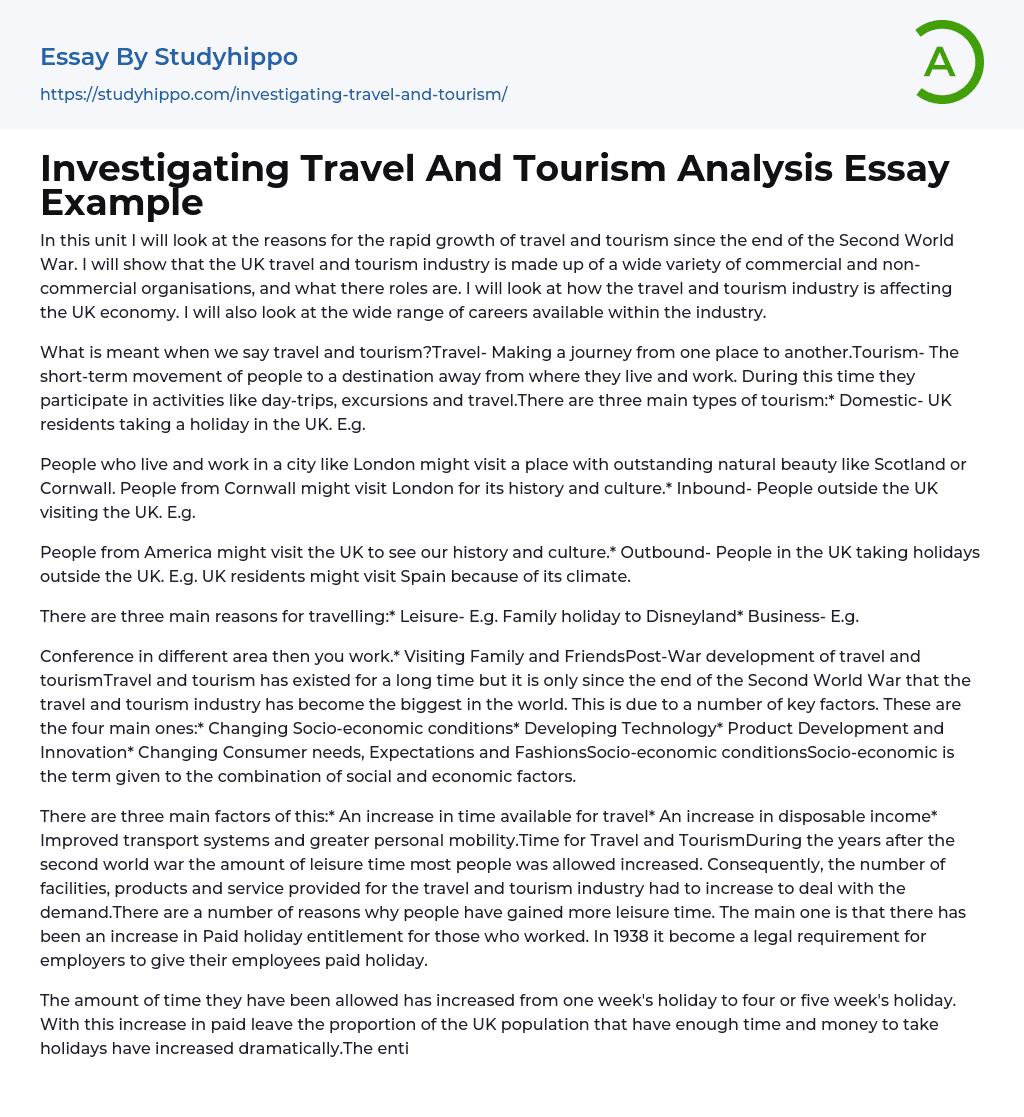This section will delve into the significant expansion of travel and tourism post-World War II. It will highlight the different commercial and non-commercial components that compose the UK's travel and tourism sector, along with their distinct roles. Additionally, we will examine how this industry influences the British economy. Lastly, we will scrutinize a diverse array of occupations present within this field.
Travel and tourism involve the act of going from one place to another for a temporary relocation in order to participate in activities such as day-trips, excursions and travel. There are three main categories of tourism: domestic tourism, which involves UK residents taking holidays within the UK.
Both locals and outsiders of London may opt to explore the stunning natural landscapes of Scotland or Cornwall while individuals from Cornwall could also visit London to immerse themselves in its ric
...h history and culture. As for inbound tourism, it pertains to visitors beyond UK borders who travel to the country. Example:
Americans may travel to the UK to experience our rich history and culture. Meanwhile, UK residents may vacation outside the country, such as to Spain, for its warm climate.
There are three primary motives for traveling: Leisure - such as a family trip to Disneyland, Business - such as:
Journeys for attending conferences or visiting loved ones in different places have been traditional motives for travel since ancient times. Nevertheless, it was only after WWII that the tourism industry became the biggest global industry due to various influential elements. These included modifications in socio-economic conditions, advancements in technology and product innovation, as well as evolving consumer demands and expectations. The expression socio-economic portrays the blend of socia
and economic aspects that contributed to this revolution.
The travel and tourism industry has grown due to three key factors: an increase in available travel time, a rise in disposable income, and improvements in transportation systems and personal mobility. Following World War II, people were given more leisure time, leading to a higher demand for travel-related products and services. The expansion of paid vacation benefits for workers has also been crucial in the growth of leisure time, with employers legally required to offer paid holidays since 1938.
An increase in holiday entitlement in the UK has led to more people having sufficient time and money for holidays, resulting in an increase in domestic tourism. Consumers now opt for short trips such as city breaks, shopping trips, visits to relatives, and theme parks. This development has also led to a decrease in the working week. However, Disposable Income, which refers to the amount of money available after paying for essential needs such as food, household bills, rent or mortgage remains unchanged.
The disposable income and economic conditions greatly impact consumer spending on travel and tourism. When the economy is growing, people tend to spend more on domestic and international travel due to increased disposable income, as seen in the 1980s. Conversely, during times of economic decline when disposable income decreases, individuals often reduce their vacation expenses.
In the early 1990s, the economic downturn in the UK resulted in a decline in foreign vacation demand due to worries about job loss and plummeting housing prices. Nonetheless, domestic tourism increased as British citizens sought holiday opportunities within their own country. Furthermore, advancements in transportation and personal mobility have made travel more
accessible for a larger segment of the UK population. Every year, millions of people utilise ports, railway stations, and airports while the establishment of the Channel Tunnel has further expanded this industry.
Car ownership in the UK has surpassed 20 million, with over 70% of households owning at least one car. This has made it the preferred transportation choice for domestic tourism. The rise of privately owned cars has resulted in an increase in visits to various destinations across the country, marking a significant shift from 1951 when trains, buses, and coaches were the primary modes of transportation for domestic tourists. Today, cars account for 80% of all trips.
The enhancement of road infrastructure and the rise in automobile ownership have made rural areas more easily accessible for recreational purposes. Furthermore, since the late 1960s, significant changes have occurred within the travel and tourism industry due to the introduction of Computer Reservation Systems or Global Distribution Systems (GDS), originally meant for airline bookings. Four major reservation systems - Sabre, Galileo, Amadeus, and Worldspan - have evolved globally from these systems. Thompson and Carlson are global corporations that can offer consumers information on travel products through partnerships with airlines, hotel chains, travel agencies, and tour operators; this enables customers to make purchases without leaving their homes.
The emergence of the Internet and interactive digital TV has transformed the way people buy travel. Online booking has become a valuable tool for airlines, tour operators, and travel agencies, leading them to expand their operations to include web-based services.
- Cultural Tourism essays
- Cars essays
- Bicycle essays
- Rms Titanic essays
- Renault essays
- Truck essays
- chrysler essays
- The city essays
- Racing essays
- Air Travel essays
- Business Travel essays
- Cathedral essays
- ecotourism essays
- Hospitality essays
- Hotels essays
- Kids travel essays
- Mountains essays
- Restaurant essays
- Sea Travel essays
- Tourism essays
- Travel Agency essays
- Traveling essays
- World Tourism Organization essays
- Adaptation essays
- Adventure essays
- Adversity essays
- Aging essays
- Alcohol essays
- Barbie Doll essays
- Beauty essays
- Care essays
- Carpe diem essays
- Change essays
- Chess essays
- Chicken essays
- Choices essays
- Contrast essays
- Crops essays
- Development essays
- Dream essays
- Evil essays
- Experience essays
- Family essays
- Farm essays
- Fire essays
- First Love essays
- Focus essays
- Greed essays
- Hero essays
- Holiday essays




